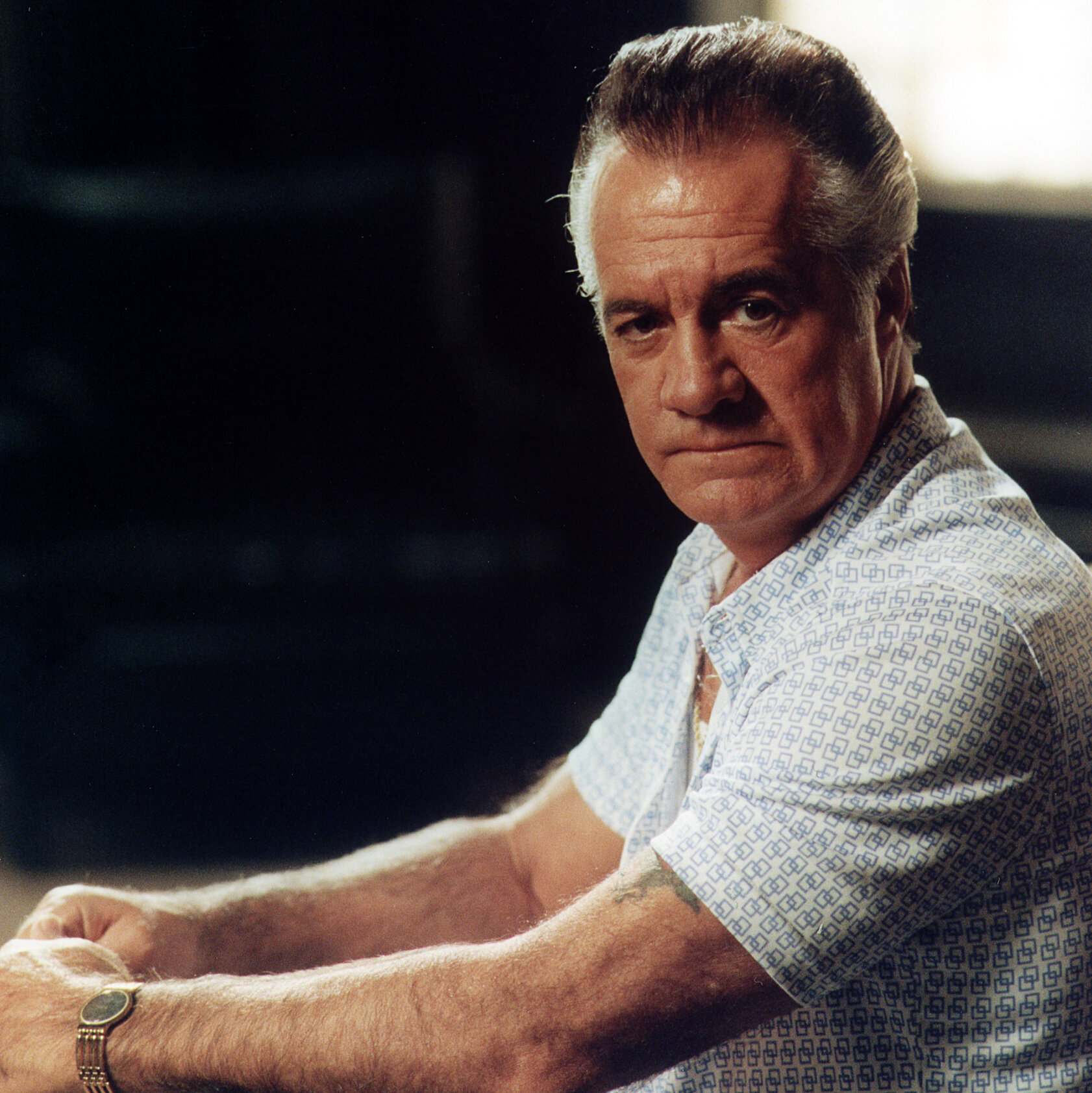Whether as Paulie Walnuts on “The Sopranos” or not, you could always spot Tony Sirico from a mile away. There was that thick, slicked-back coif of hair, flanked by two thick, winged shocks of white at the temples that would make Doctor Strange jealous. And then there are the eyes: jet-black but soulful, bordered by thick expressive brows and pursed, sucked-back lips just as likely to snarl a threat as crack a joke.
He looked like a gangster, and that’s probably because, earlier in life, he was. Growing up in Bensonhurst in the ‘40s and ‘50s, he was surrounded by “mob-type people,” he once told Cigar Aficionado. A young, impulsive man, he married early, had two kids, and worked in construction before falling for a younger woman and “running with the wrong type of guys,” he says in James Toback’s 1989 documentary “The Big Bang.” He was arrested twenty-eight times (starting at the age of seven for stealing nickels from a newsstand); on the twenty-eighth, he was convicted for extortion, coercion, and felony weapons possession, spending 20 months in Sing Sing for the trouble.
It was in prison that he found his new calling, inspired by a traveling troupe of ex-con thespians who performed where he was incarcerated. When he got out, he pursued work as an actor, his weathered face and tough-guy persona fitting the Hollywood daydream of a wise guy. From there, he made his mark as a made man in films ranging from “GoodFellas” (as Tony Stacks, the guy who shoves a man’s head in a pizza oven) to several Woody Allen pictures (starting with the mob-centric theater farce “Bullets Over Broadway”).
But of course, it’s his portrayal of Paulie Gualtieri, aka “Paulie Walnuts” (so named for the time he held up a shipping truck full of TV sets, only to find nuts instead), for all six seasons of HBO’s genre-defining series “The Sopranos” that catapulted him to instant fame. Paulie was one of Tony Soprano’s most loyal lieutenants, an old-school avatar of Italian machismo who flitted between bright-eyed geniality and ferocious violence. He was also, it must be said, one of the great tragicomic characters on television.
“The Sopranos” was, among many other things, a show about changing cultures, one resting on the premise of old-school “Godfather”-esque gangsters (Sirico’s first role was as an extra on “Part II”) with the increasingly cosmopolitan and liberal ideals of the 21st century. But while characters like Tony and Michael Imperioli’s Christopher Moltisanti had to grapple with adapting to those times, the fast-talking Paulie was ever resilient against the winds of change, an old hand accepting of the life he’s already lived. “I got no arc…” he says bluntly to Christopher in the show’s first season. “I was born, grew up, spent a few years in the Army, a few more in the can. And here I am, a half-a-wiseguy. So what?”
Sirico had a blast playing those moments. In just the second episode, he throws a fit to Vincent Pastore’s Big Pussy about the presence of a snooty corporate coffee shop selling their heritage back to them at a markup: “F**kin’ espresso, cappuccino; we invented the shit, and all these other c**ks**kers are getting rich off it.”
Paulie is a character proud of his italianità, and was never bothered with the burden of trying to change his ways, which is what made him such a delightful contrast to the conflicted characters in the cast. When he took the role, Sirico insisted that Paulie never be revealed as a rat, lest he disrespect his friends in “the old neighborhood.” And so he did, Paulie remaining a mainstay of Tony’s entourage alongside Steve Van Zandt’s Silvio Dante throughout the show’s duration.
Sirico made Paulie watchable and lovable, even as he racked up the highest body count of any major character in the show (he whacked a whopping nine people over those six seasons). His face, perpetually half-frozen in a deeply Sicilian scowl, was always a great canvas for comedy; no one could fire off a witticism or sheepishly look over their shoulder quite like him.
In so many ways, Sirico was Paulie, right down to insisting on his own wardrobe and doing his own hair rather than let David Chase’s butchers lay a single hair on his perfect dome. His mannerisms, like the way he used his pinky finger when pointing, became signature Paulie affectations. They even used Sirico’s apartment to stand in for Paulie’s.
Paulie was a man of enticing contradictions, a goofy uncle and mass murderer all in one. He was fussy about poison ivy and what kind of finish he put on his nails (satin), but when it came down to doing Tony’s bidding, he was first in line for the bloodletting. That’s not to say his guilt didn’t creep in from time to time; In “From Where to Eternity,” he sees a medium to confirm whether Christopher’s morphine-addled prediction he’s going to hell will come true, only for the man to confront him with the ghost of his first victim: “That’s what this is—Satanic black magic! Sick shit!” But his relationship with Tony remained steadfast, as even his flirtations with leaving would result in him rescuing a painting of Tony from destruction, only to repaint his leader as a Napoleonic hero and putting it on his wall. Whatever emotions Paulie felt, he expressed them intensely.
But it was Season Three’s “Pine Barrens” that was probably Sirico’s, and the show’s finest hour. The episode sends him and Christopher out on a farcical job to kill a seemingly-unstoppable Russian mobster, which ends with the two of them trundling through the wintry woods, Sirico’s signature ‘do puffed up like Albert Einstein as he shivers and whines about having to walk half-barefoot in the snow. It’s a gut-busting hour that let Sirico play every broad note in which he excelled, the Bob Hope to Christopher’s Bing Crosby.
After “The Sopranos,” Sirico continued to play wiseguys and cops in dozens of films and TV shows (including as a mobbed-up pooch in “Family Guy”), even in his later years as his health and mental acuity declined. During interviews in the last years of his life, he seems startlingly frail, struggling to remember where he is or what is being asked. And yet, a glimmer of Paulie would come through in one ball-busting remark or another; the man and the mafia seemed to course through his blood just as much as his brain.
Near the end of “The Big Bang,” Toback asks a 45-year-old Sirico, still a gangster and not yet a TV icon, if he’s afraid to die. “No,” he answers matter-of-factly. “That doesn’t frighten me at all.” Is he eager to die? Sirico laughs. “I used to be. I’ve lived a life.” One, it now seems in retrospect, that fit a half-a-wiseguy like him.












